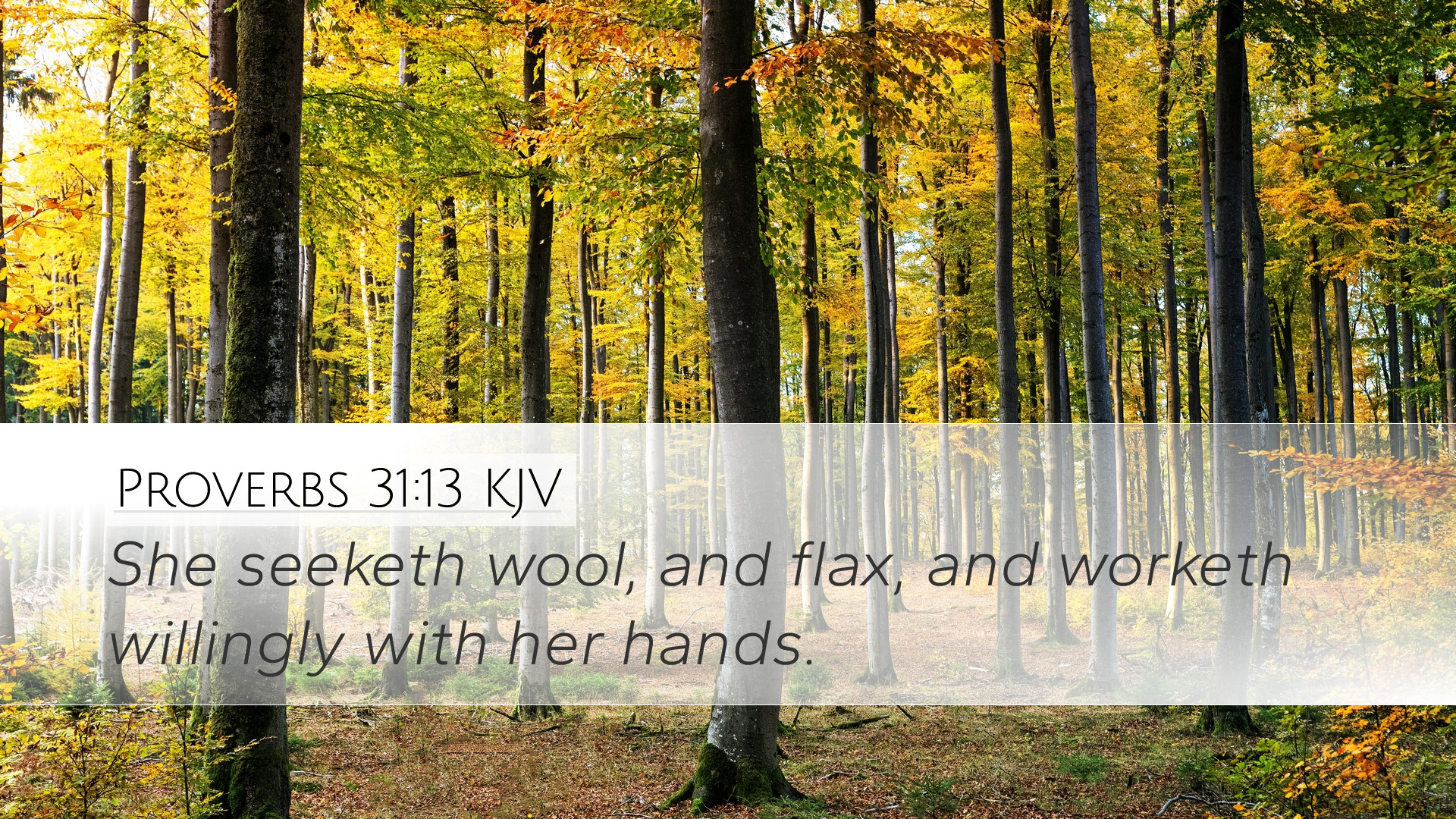Commentary on Proverbs 31:13
Verse Overview: Proverbs 31:13 states, "She seeketh wool, and flax, and worketh willingly with her hands." This verse opens a window into the character of the virtuous woman, emphasizing her industrious nature and her commitment to providing for her household.
Introduction
The Book of Proverbs provides practical wisdom for daily life, and Proverbs 31 is particularly revered for its portrayal of the ideal woman. This passage emphasizes her diligence and resourcefulness. Public domain commentaries shed light on the various aspects of this verse, offering insights suitable for pastors, students, theologians, and Bible scholars.
Insights from Matthew Henry
Matthew Henry notes the importance of the "virtuous woman" in the context of familial and communal well-being. He encourages a strong work ethic, signifying that her search for "wool and flax" symbolizes the foundational necessities of life. Henry emphasizes the following:
- Resourcefulness: The virtuous woman is characterized by her ability to find and utilize resources wisely. Wool and flax are raw materials that require effort to transform into garments, symbolizing her diligence in providing for her family.
- Proactive Nature: Henry highlights that she "worketh willingly with her hands," suggesting a disposition of joy and commitment towards her responsibilities. This teaches us about the importance of attitude in labor.
- Domestic Economy: The pursuit of these materials is indicative of a broader principle of managing household duties efficiently. Henry points out that the virtuous woman is not just involved but is intentionally contributing to the creation and maintenance of her home.
Insights from Albert Barnes
Albert Barnes provides a detailed analysis of Proverbs 31:13, emphasizing the attributes of wisdom and practicality exhibited by the virtuous woman. Barnes reflects on several important aspects:
- Industriousness: Barnes stresses that the woman actively seeks materials; this speaks to her initiatory spirit and preparedness to engage in work that benefits others.
- Social Responsibility: He suggests that her search for wool and flax illustrates a sense of responsibility toward her family and community. The virtuous woman embodies the Proverbs 31 ideal by being both wise and proactive in her economic endeavors.
- Symbol of Strength: According to Barnes, the ability to work with her hands denotes not merely labor but the strength of character and will which the woman possesses, countering the notion that domestic work lacks value.
Insights from Adam Clarke
Adam Clarke's commentary emphasizes the spiritual significance of the tasks undertaken by the virtuous woman. His insights are profound, elaborating on several themes:
- Spiritual Metaphor: Clarke interprets the "wool and flax" as representing the principles of teaching and nurturing. He links the pursuit of these materials to the moral and spiritual development of her family.
- Commitment to Excellence: Clarke argues that her willingness to labor reflects a commitment to excellence in all things, not just in seeking materials but in nurturing and raising her children.
- A Testament of Faith: The commentator suggests that the essence of her work flows from a heart of faithfulness. Thus, she exemplifies how practical work can be a form of spiritual service and devotion.
Application for Pastors and Theologians
The teachings found within Proverbs 31:13 and the associated commentaries offer fertile ground for reflection and application in various ministries:
- Cultivating Diligence: Pastors can encourage congregations to foster a spirit of industriousness in their daily tasks, whether in household management, employment, or community involvement.
- Empowerment of Women: This verse champions the virtues of women, providing assurance to female members of the congregation about their vital roles both domestically and within the church.
- Holistic Ministry: This chapter prompts families and church leaders to examine the balance between work and worship, affirming that secular tasks can be spiritually significant when approached with the right mindset.
Conclusion
Proverbs 31:13 serves as a rich verse that encapsulates the dynamic character of the virtuous woman. As Christians seek to emulate her attributes—resourcefulness, industriousness, and spiritual devotion—they contribute not only to their own households but also to the broader community. Through the insights of Matthew Henry, Albert Barnes, and Adam Clarke, this verse encourages a reflection on the beauty of diligent work and the value of female contributions in both family and society.


